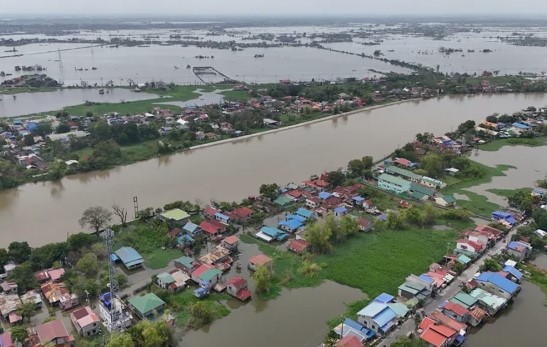Philippine President Ferdinand Marcos Jr has ordered lifestyle checks on government officials after repeated reports of corruption in flood control projects. The move came after massive flooding hit several provinces, including Metro Manila, in July. In just four days, the capital recorded more than a month’s worth of rainfall, leaving homes and roads submerged.
Billions Spent but Floods Still Drown Provinces
The government has already spent 545 billion pesos (about US$9.5 billion) on flood control and management since 2022. Yet, many flood-prone areas remain unprotected. A preliminary investigation revealed that 20 per cent of the budget for flood control projects went to only 15 contractors across the country. This raised questions about whether public money was being fairly and effectively used.
President Marcos expressed his anger after visiting Bulacan province, where a 55 million-peso river wall was supposed to have been built as part of a flood control effort. Instead, he found an empty site. “They didn’t work for even a single day. Even if you see it for yourself, you won’t see anything,” he said, describing the so-called project as a “ghost” construction. Marcos warned that those involved in such fraudulent schemes could face charges of economic sabotage.
Japan, U.S., Philippines Hold Joint Drills Amid China Sea Tensions
Officials confirmed that the lifestyle checks would begin with the Department of Public Works and Highways (DPWH), which oversees most of the country’s flood control and infrastructure projects. The DPWH has long faced criticism over alleged corruption, especially in programs linked to flood control.
Lifestyle Checks and Flood Control Corruption
According to presidential press officer Claire Castro, the lifestyle checks will cover the entire executive branch, with DPWH officials being the first to undergo scrutiny. Lifestyle checks aim to detect if a government official is living beyond their legal income, which may suggest hidden sources of money connected to flood control funds or other projects.
Castro explained that the checks would be conducted independently by the agencies themselves, with the help of the Office of the Ombudsman and the Bureau of Internal Revenue. She emphasized that the process would be non-partisan. Marcos has also encouraged the public to report suspicious flood control projects through a dedicated website. Since its launch on August 11, the site has received more than 9,000 reports.
💥 Deal of the decade? Trump slaps 19% tariff on Philippines—U.S. exports get free pass
Despite these efforts, analysts remain cautious. They argue that lifestyle checks, while useful, may only scratch the surface. Political science instructor Gino Trinidad from Ateneo de Manila University said such checks often end up being more “performative than effective.” According to him, these measures sometimes serve more as a way for leaders to protect their image rather than to solve deep-rooted corruption in flood control programs.
Political science lecturer Matthew Ordoñez of De La Salle University also shared his doubts. He pointed out that lifestyle checks risk becoming tools to eliminate political opponents rather than meaningful ways to fight flood control corruption. He explained that experienced officials who engage in corrupt practices are usually skilled at hiding their wealth, making it difficult for lifestyle checks alone to expose them fully.
Corruption Patterns in Flood Control Projects
Concerns about corruption in flood control are not new. Earlier this month, veteran senator Panfilo Lacson delivered a detailed speech in the Senate highlighting widespread irregularities. He revealed that officials properly used only 40 per cent of funds for flood control projects. He claimed that kickbacks and bribes swallowed the rest.
According to Lacson, some lawmakers took up to 25 per cent of the funds as commissions for projects they sponsored. Contractors and officials also used substandard materials to cut costs or pocketed money by creating “ghost projects” that never even began. He called such ghost projects the “worst kind” of corruption because they drained public funds meant for flood control while leaving flood-prone areas vulnerable.
Analysts say this pattern shows why simple lifestyle checks may not uncover the entire network of flood control corruption. Trinidad noted that in some cases, the very politicians who face accusations of involvement in questionable projects also lead the investigations. This situation raises doubts about whether anyone can achieve accountability when compromised watchdogs conduct the probes.
Fake News Tsunami Hits Canada Days Before Election — Deepfakes and Crypto Scams Flood Facebook
Ordoñez warned that even when investigators expose irregularities, the public sees only a fraction of the corruption in government spending. He said corrupt officials hide most practices, making lifestyle checks look like “patch-up solutions” to a larger problem.
Anti-corruption groups have urged stronger measures, including stricter audits, tighter procurement rules, and independent monitoring to stop inflated contracts and ghost projects. Analysts also suggest direct citizen involvement to improve transparency.
For now, the government relies on lifestyle checks, even as corruption has already drained billions while floods continue to affect ordinary Filipinos.
